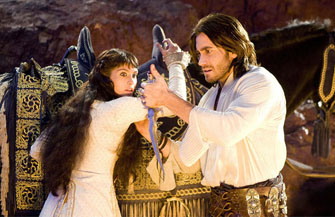Movie Review:
Prince of Persia: The Sands of Time
By Matthew Huntley
June 2, 2010
Prince of Persia: The Sands of Time illustrates why video games don’t usually adapt well to the cinema. Video games come with their own sets of rules and we accept the way they compromise logic and credibility because we don’t play them expecting to invest in the story or characters. Our minds focus on the superficial elements like action, violence and graphics (which, by the way, are not easy to program). The problem with Prince of Persia is that it thinks it can win over a film audience the same way a game can win over a gamer - by being solely about flashiness and design. It can’t and it doesn’t. With the cinema, you have to have at least some substance.
There is not one convincing shot throughout this entire production, which is rather murky and sloppy for a big budget Hollywood enterprise. Every image looks fabricated and cheap. Cinematographer John Seale and production designer Wolf Kroeger are under the impression we came wanting to see a video game world projected onto the big screen, but it doesn’t work. The movie looks noisy and blocky, almost as if it didn’t have enough time to fully render. And the director, Mike Newell, doesn’t call his shots very well. Too much is filmed in close-up, and for an adventure story taking place in the expansive desert, the movie has a hard time breathing and opening itself up. Perhaps the filmmakers wanted to mask the obvious green screen as much as possible, but even if that was the case, we’ve seen it done better than this.
The movie is adapted from the popular video game series by Jordan Mechner, who now takes credit for the screen story. It follows Dastan (Jake Gyllenhaal), the adopted son of King Sharaman (Ronald Pickup) of Persia, who once witnessed the boy’s bravery and ability to leap and bound around the marketplace. Right then and there, the king decided to take him under his wing, placing him alongside his other sons, Tus (Richard Coyle) and Garsiv (Toby Kebbell).
Fifteen years later, the King receives word from his suspicious brother, Nizam (Ben Kingsley), that the sacred city of Alamut is selling weapons to Persia’s enemies, which prompts Tus and Garsiv to lead a pre-emptive attack on Alamut and bring the city under Persian control. (I’m not sure if the movie was attempting to make a statement about the United States’ invasion of Iraq, but that’s probably not a part of its agenda.)
Dastan reluctantly joins his brothers in the attack. In doing so, he comes across the mythical Dagger of Time, which gives whoever uses it the ability to go back in time. The Princess of Alamut, Tamina (Gemma Arterton) makes it her mission to protect it, even if it means escaping with Dastan after he is framed for killing the king.
During their escape, Dastan and Tamina come upon a pair of social outcasts, one of whom is played by Alfred Molina. Molina and Arterton are the lone bright spots on the acting front. They are the only ones who seem to really believe in their roles. Gyllenhaal is grossly miscast and hardly convincing as the hero, and based on his limited dialogue, it would seem I’m not the only one who thinks so. It’s like the filmmakers wanted to keep his speaking to a minimum because they knew his performance was sub-par. What accent was he speaking with, anyway? Even Ben Kingsley doesn’t add much to this bloated and ultimately ineffectual imitator of Indiana Jones and The Mummy. There is a lot that happens on-screen, but so little actually affects or engages the audience.
I knew the movie was adapted from a video game going in, so the story being silly and dimwitted was a given - I wasn’t expecting great writing or intriguing plot developments - but the action sequences and spirit should have compensated for it. I was disappointed by the way everything was filmed and even by the way people moved. The characters’ motion felt so artificial and cartoony that there was nothing tangible to grab onto, let alone believe. Everything moves so fast and is filmed so tight that after a while, I only saw a bunch of “things” on screen, yet none of them mattered to me.
As the credits rolled, some members of the audience began to clap. What were they applauding, exactly? Did I miss something? A movie like Prince of Persia is supposed to work because it’s silly, stupid and fun, but it only gets two out of three of these right. I’ve never played the video games, but given their popularity, I believe there’s probably something to admire about their design and effect. The same cannot be said of the movie.

![]() Tweet
Tweet
![]() Print this column
Print this column



